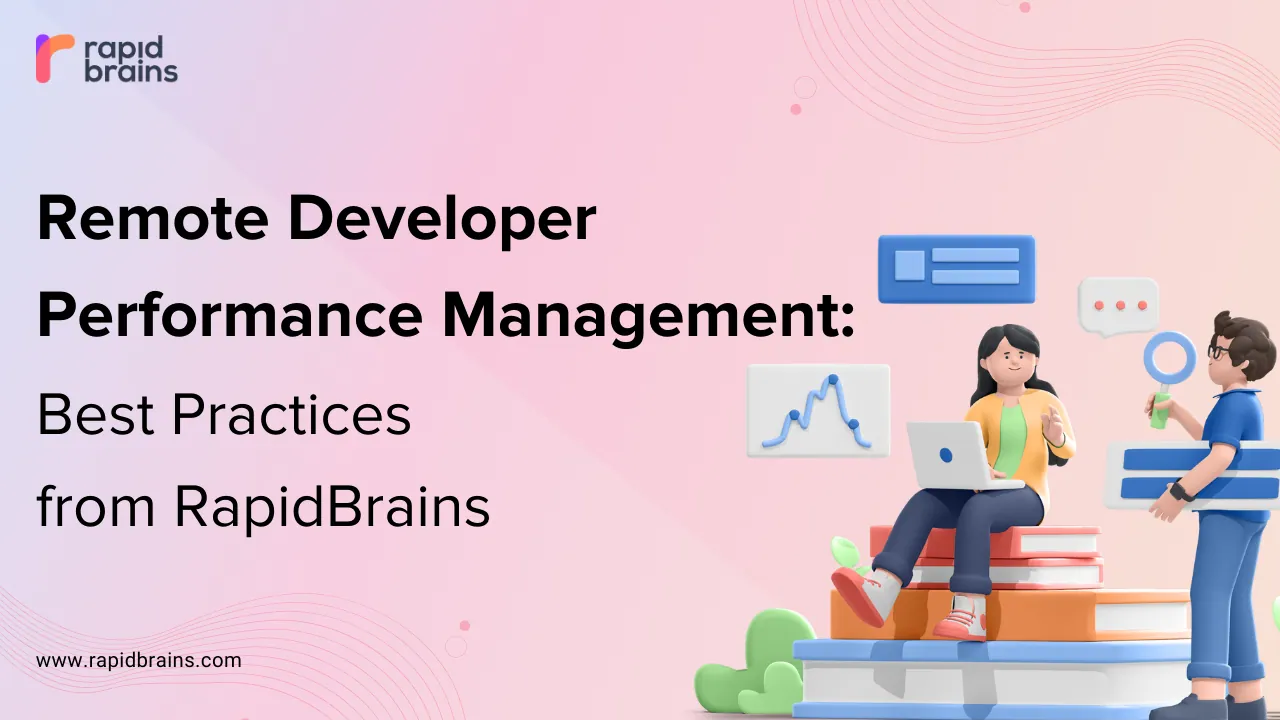
Introduction
In today’s fast-paced world, the concept of remote work has transformed from a trend to a necessity. As remote work continues to gain prominence, the role of remote developers has become increasingly crucial. However, managing the performance of remote developers comes with its own set of challenges. In this blog post, we’ll explore the best practices for remote developer performance management, drawing insights from the successful strategies employed by RapidBrains.
Remote work has redefined the traditional office landscape. With the flexibility it offers, remote work has allowed businesses to tap into a global pool of talent, including remote developers. But how do you ensure that your remote development team is performing at its best, despite geographical barriers? That’s where effective remote developer performance management steps in. Let’s dive into the strategies that can help you optimize your remote team’s performance.
Clear Communication and Expectations
Transparent Communication
Effective remote developer performance management begins with transparent communication. Remote developers need to have a crystal-clear understanding of their roles, responsibilities, and the expectations set for their performance. Regular team meetings, virtual one-on-one sessions, and open communication channels are essential to ensuring that everyone is on the same page.
Goal Setting and Alignment
Setting specific, measurable goals is key to performance improvement. Remote developers should be aligned with the larger organizational goals and understand how their contributions fit into the bigger picture. This alignment not only boosts motivation but also gives remote developers a sense of purpose and direction.
Feedback Loop
Feedback is a two-way street. Remote developers should receive regular feedback on their work, including both constructive criticism and positive reinforcement. Managers should create an environment where remote developers feel comfortable asking for feedback and discussing their challenges. This continuous feedback loop promotes growth and development.
Leveraging Technology for Collaboration
Choosing the Right Tools
Technology acts as the backbone of remote work. Invest in reliable project management tools, communication platforms, and video conferencing software. These tools facilitate seamless collaboration, making it easier for remote developers to connect, share updates, and collaborate on projects, regardless of their physical locations.
Virtual Team Building
Remote work can sometimes lead to a feeling of isolation. To counter this, encourage virtual team-building activities. Virtual coffee breaks, online team-building games, and informal virtual hangouts can foster a sense of camaraderie among remote developers, enhancing their motivation and engagement.
Knowledge Sharing and Documentation
In a remote setting, sharing knowledge and documenting processes become even more critical. Create a centralized repository for documentation, best practices, and coding standards. This ensures that remote developers have easy access to information and reduces the chances of misunderstandings.
Performance Metrics and Recognition
Data-Driven Performance Metrics
Performance metrics provide insights into the productivity and efficiency of remote developers. Track metrics like code quality, task completion time, and adherence to deadlines. These metrics offer a clear understanding of individual and team performance, enabling you to make informed decisions.
Recognition and Incentives
Remote developers thrive on recognition, just like their in-house counterparts. Publicly acknowledge their achievements during team meetings, share success stories, and offer incentives for exceptional performance. Recognition boosts morale and motivates remote developers to maintain their high standards of work.
Professional Development Opportunities
Invest in the professional growth of your remote developers. Offer opportunities for upskilling, training, and attending virtual conferences. Providing avenues for skill enhancement not only benefits individual remote developers but also adds value to the entire team.
Continuing Your Learning Journey
Remote Work Best Practices
Dive deeper into the world of remote work and explore tips for managing remote teams effectively.
Virtual Team Collaboration Tools
Learn about the various tools and software available for enhancing virtual collaboration among remote teams.
Remote Developer Productivity Hacks
Discover strategies to boost the productivity of remote developers, from time management techniques to creating an optimal workspace.
Conclusion
In conclusion, remote developer performance management is a blend of clear communication, technological empowerment, data-driven insights, and recognition. By implementing these best practices from RapidBrains, you can maximize the potential of your remote development team and drive exceptional results. Remember, distance is no barrier to success when you have the right strategies in place.




